Make your own DIY Mala necklace for meditation
Malas are traditional Indian meditation chains with 108 beads. According to the ancient Vedic scriptures, the human body consists of 72,000 energy channels called nadis. There are 108 important nadis which all join together in the hrit padma chakra right under the heart. By repeating a mantra 108 times during meditation you reach out to them on an energetic level. In order to know how far you have come in your meditation without counting, you use a mala. Furthermore., the three digits of the number 108 contain the symbols of the three basic charakteristics of the universe: unity, emptiness and infinity.
Although malas are traditionally used as prayer chains, you do not need to be deterred by that. You can use them as a reminder of your positive intentions independent of your religious belief and life style.
You can wear the mala chain around your neck, wrap it around your wrist or make a bracelet. Many people wear it under the clothes, directly on their skin and near to their heart. Of course, you can take your mala to yoga class to concentrate on yourself and to recharge the chain with positive yoga energy. Put the chain on the floor at the head end of your mat. The beads absorb your body’s energy and store it, while returning energy to you at the same time. This makes a mala is a very personal item, and therefore it should not be lent out or used by other people.
If you want to know more about mala chains, stones and meditation, you will find useful information in this Yoga Journal article.
The mala necklaces shown in the pictures were made with silk beading thread with knots between the beads. In Smyks’ jewellery guide you find instructions on how to tie knots between beads using tweezers.
Instead of tweezers, you can also work with a bead knotter. This handy tool makes it very easy to tie knots between the beads.
Click here to browse our assortment of guru beads which are often used to complete a necklace or bracelet.
Additionally, we recommend our earlier blog post Zodiac and Gemstones where you can read about the characteristics of the various semi-precious-stones and learn which zodiac sign they correspond to.
For all examples, we recommend using a small dab of strong jewellery glue on the final/joining knots.
Mala necklace with candy jade and pyrite
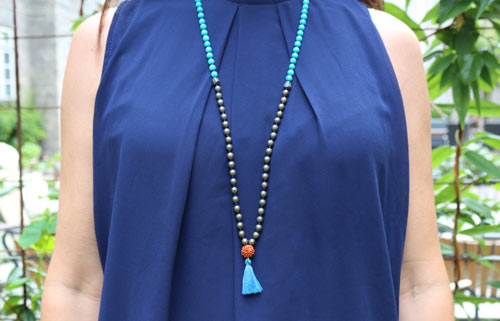
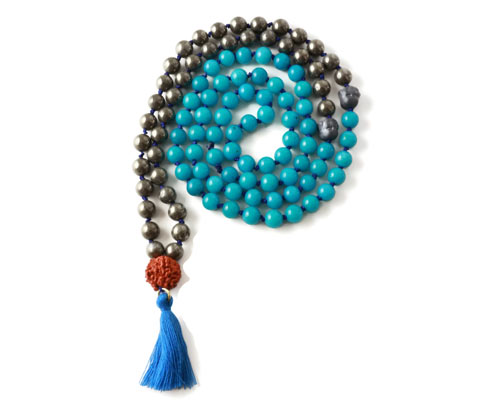
You need the following materials to make this necklace:
- 40 pcs. candy jade, 6mm, turquoise-blue
- 2 pcs. haematite, Buddha, 6mm
- 66 pcs. pyrite, 6mm
- 1 pcs. Rudraksha nut bead
- 1 pcs. tassel, blue
- 1 jumpring, 5mm, gilded brass
- silk beading thread, 0.70mm, dark blue
- bead knotter (optional)
The silk beading thread we sell has got a length of 2 metres and a needle on one end. This makes it very easy to thread the beads. You need approx. 1,5 m for one chain.
First you prepare the tassel: You open the jumpring, hang the tassel into it and close the jumpring again. Then, you start threading the beads: String 20 candy jade beads followed by a haematite bead and 33 pyrite beads. Tie knots between the beads. When this is done, you pull the string through the wooden nut, then through the jumpring on the tassel and back again through the nut. Next, you complete the second half of the chain, threading the beads like you did before. Finally, you tie the silk thread in the neck and apply a bit of jewellery glue on the knot so it will not open up again. Cut the excess thread.
Mala necklace with howlite and wooden beads
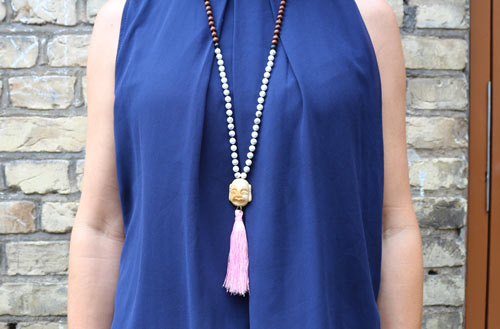
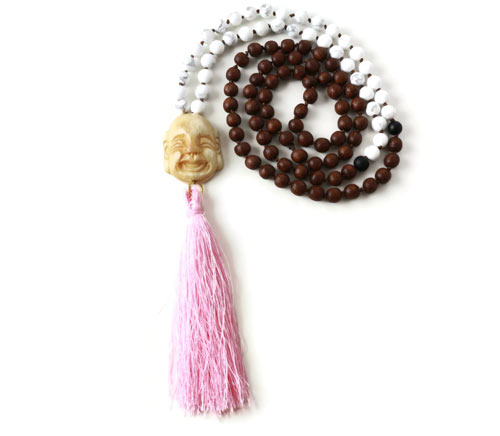
You need the following materials to make this necklace:
- 40 pcs. wooden beads, 6mm
- 2 pcs. blackstone, matte, 6mm
- 66 pcs. howlite, 6mm
- 1 pc. Buddha, bone bead (no longer available)
- 1 pc. tassel, pink
- 1 pc. jumpring, 7mm, gilded brass
- silk beading thread, 0.70mm, brown
- bead knotter (optional)
The silk beading thread we sell has got a length of 2 metres and a needle on one end. This makes it very easy to thread the beads. You need approx. 1 ½ m for one chain.
First you prepare the tassel: You open the jumpring, hang the tassel into it and close the jumpring again. Then, you start threading the beads: String 20 wooden beads followed by a blackstone bead and 33 howlite beads. Tie knots in between the beads. When this is done, you pull the string through the Buddha bead, then through the jumpring on the tassel and back again through the Buddha head. Next, you complete the second half of the chain, threading the beads like you did before. Finally, you tie the silk thread in the neck and apply a bit of jewellery glue on the knot so it will not open up again. Cut the excess thread.
Mala necklace with grey agate and lapis lazuli
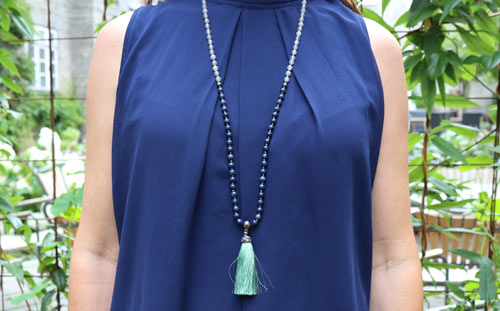
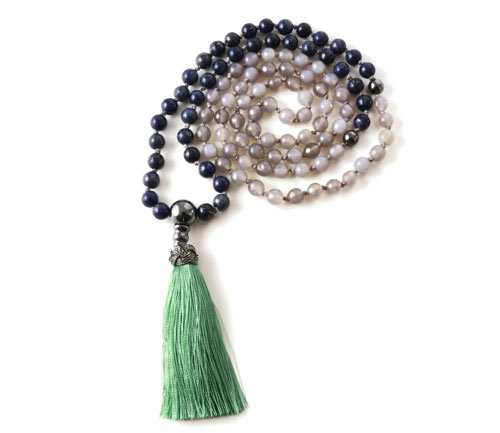
You need the following materials to make this necklace:
- 40 pcs. grey agate, facetet, 6mm
- 2 pcs. hematite, 6mm
- 66 pcs. lapis lazuli, 6mm
- 1 pcs. hematite, bead with 3 holes, 10mm, Guru bead
- 1 pcs. tassel, turquoise
- silk thread, 0.7mm, grey
- bead knotter (optional)
The silk beading thread we sell has got a length of 2 metres and a needle on one end. This makes it very easy to thread the beads. You need approx. 1 ½ m for one chain.
First, you string the beads. You start with 20 grey agate beads followed by a haematite bead and 33 lapis lazuli beads. Tie knots in between the beads. When this is done, you pull the string through the haematite bead with 3 holes and through the haematite tube bead. Next, you pull the thread through the cord of the tassel. In the tassel there is a plastic tube, this is where you insert the thread. Take the cord of the tassel, tighten it and tie a knot. Cut the excess cord. Now, you complete the second half of the chain, threading the beads like you did before. Finally, you tie the silk thread in the neck and apply a bit of jewellery glue on the knot so it will not open up again. Cut the excess thread.
Mala bracelets
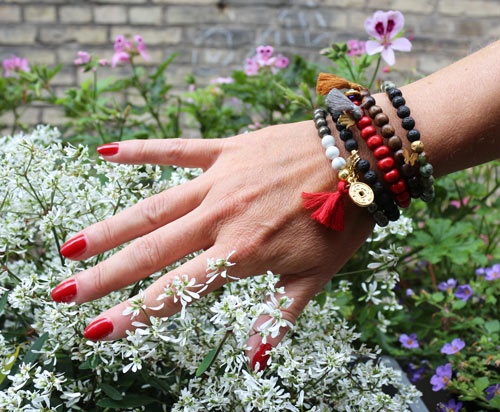
We used elastic cord to make these mala bracelets. Every bracelet consists of 27 beads, so that it can be used for meditation exactly like a necklace. You just have to go through the beads four times to reach the number 108.
Elastic cord with a diameter of 1mm fits through most of the gemstones beads with a diameter of 6mm, but the knots are quite big and difficult to hide. This is why we used elastic cord with a diameter of 0.8mm or 0.6mm for our examples.
While meditating, you should know when you have finished one round on your bracelet without counting. Therefore, we included tassels and charms and beads which feel differently.
Mala bracelet with pyrite and howlite
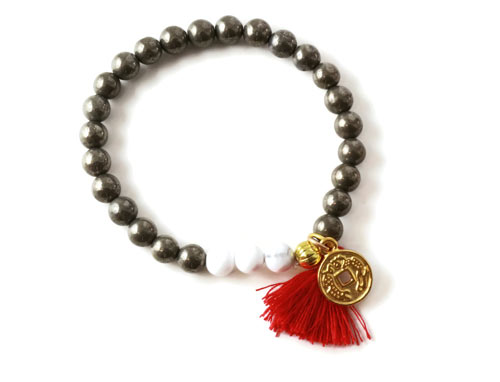
We used the following materials to make this bracelet:
- 24 pcs. pyrite, 6mm
- 3 pcs. howlite, 6mm
- 1 pc. bead, gilded brass
- 1 pc. tassel, red
- 1 pc. Chinese lucky coin, gilded brass
- 2 pcs jumprings, 5mm, gilded brass
- elastic cord, powercord, transparent, 0.8mm
Thread the beads onto the elastic cord. Open the jumprings and hang the tassel into the one and the Chinese coin into the other. Then you close the jumprings again. Next, you pull the elastic cord through the two jumprings. Tie a double knot or a surgeon’s knot. Apply a bit of jewellery glue on the knot and pull it into the golden bead. Once the glue is dry, you cut the excess elastic cord. For our example, we also trimmed the tassel.
Mala bracelet with red wooden beads
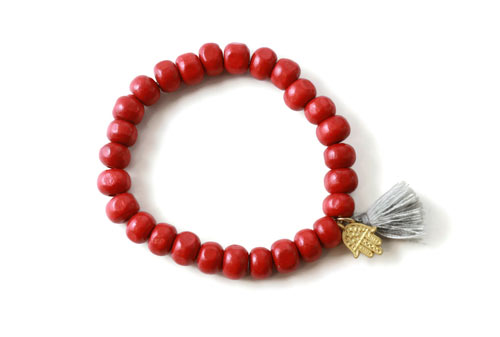
We used the following materials to make this bracelet:
- 27 pcs. red wooden beads
- 1 pc. Hamsa (hand of Fatima), gilded
- 1 pc. tassel, light grey
- 1 pc. jumpring, 5mm, gilded brass
- elastic cord, powercord, transparent, 0.8mm
(alternatively 1 reel of elastic cord, 0.8mm, 6m)
Thread the beads onto the elastic cord. Open the jumpring, hang the tassel into it and close the jumpring again. Then you pull the elastic cord through the jumpring on the tassel and next through the eyelet of the hamsa. Tie a double knot or a surgeon’s knot. Apply a bit of jewellery glue on the knot and pull it into the wooden bead (the hole in the wooden bead is large enough to hide the knot). Once the glue is dry, you cut the excess elastic cord. For our example, we also trimmed the tassel.
Mala bracelet with turquoise and lava beads
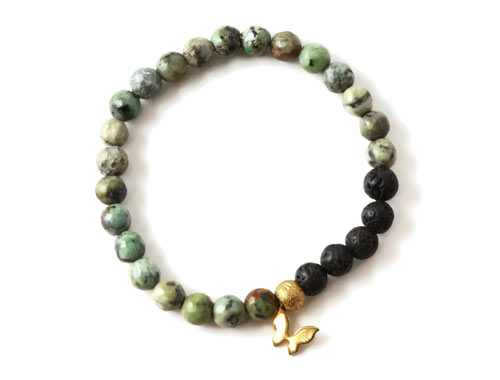
We used the following materials to make this bracelet:
- 22 pcs. African turquoise, facettiert, 6mm
- 5 pcs. lava beads, 6mm
- 1 pc. gilded stardust bead, 6mm
- 1 pc. charm, butterfly, gold-plated silver
- elastic cord, powercord, transparent, 0.8mm
(alternatively 1 reel of elastic cord, 0.8mm, 6m)
Thread the beads and the charm onto the elastic cord. Tie a double knot or a surgeon’s knot. Apply a bit of jewellery glue on the knot and pull it into the golden bead. Once the glue is dry, you cut the excess elastic cord.
Mala bracelet with wooden beads
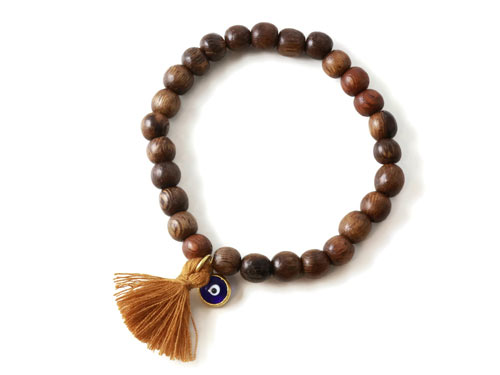
We used the following materials to make this bracelet:
- 27 pcs. wooden beads, 6mm
- 1 pc. charm, lucky eye, gilded brass
- 1 pc. tassel, caramel
- 1 pc. jumpring, 5mm, gilded brass
- elastic cord, powercord, transparent, 0.8mm
(alternatively 1 reel of elastic cord, 0.8mm, 6m)
Thread the beads onto the elastic cord. Open the jumpring, hang the tassel into it and close the jumpring again. Then, you pull the cord through the jumpring on the tassel and through the eyelet of the charm. Tie a double knot or a surgeon’s knot. Apply a bit of jewellery glue on the knot and pull it into a wooden bead. Once the glue is dry, you cut the excess elastic cord. For our example, we also trimmed the tassel.
Mala bracelet with lava beads
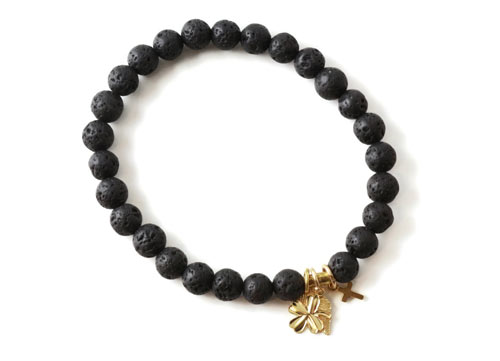
We used the following materials to make this bracelet:
- 27 pcs. lava beads, 6mm
- 1 pc. tube bead
- 1 pc. lucky clover, gilded brass
- 1 pc. leaf, gilded brass
- 1 pc. cross, gilded steel
- 3 pcs. jumprings, 5mm, gilded brass
- elastic cord, powercord, black, 0.5mm
(alternatively 1 reel of elastic cord, 0.8mm, 6m)
Thread the lava beads and the tube bead onto the elastic cord. Tie a double knot or a surgeon’s knot. Apply a bit of jewellery glue on the knot and pull it into the tube bead. Once the glue is dry, you cut the excess elastic cord. Open the jumprings and hang the charms into them. Finally, you place the jumprings around the tube bead and close them again.
Have fun making your own mala necklaces and bracelets!
Have you got any questions, suggestions or comments? Please write to us in the commentary field below. Thank you!

We will publicly show your name and comment on this website. Your email is to ensure that the author of this post can get back to you. We promise to keep your data safe and secure.